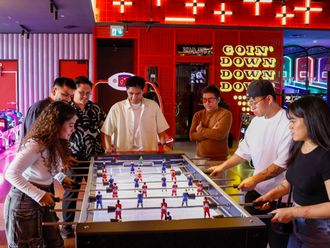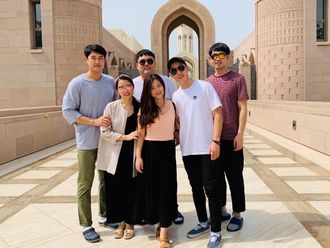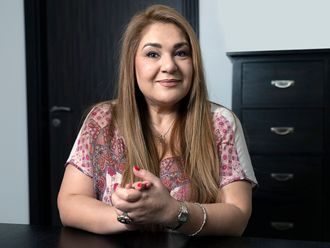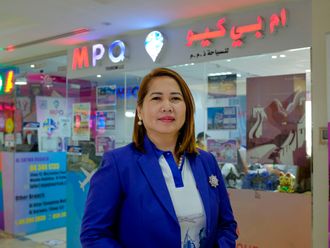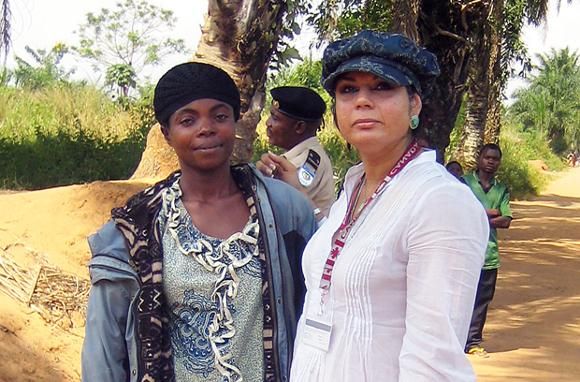
Zubaida Rasul-Ronning curled up as best she could on the single bed, her body heavy with fatigue and her mind longing for a slice of home. For a fleeting moment she allowed her thoughts to wander to a land of distant memories and miles, a place where the simple luxuries of relaxing baths and escapist novels were often taken for granted by most.
A momentary lapse afforded by a rare and fleeting ceasefire, Zubaida’s thoughts were snatched back by the outside sounds of resuming warfare. RPG bomb explosions and AK47 bursts filled the air, snapping her back to the reality of the metal United Nations container in which she was lying, and the harsh realities of her present home, Angola.
Zubaida was half way through her first posting as a UN Peacekeeper, a two-year stint during the last decade of the West African country’s civil war (1975-2002) following independence from Portugal. Working all hours alongside UN military liaison officers, she had the thankless and seemingly fruitless task of encouraging the implementation of a distant peace agreement between two factions warring for supremacy.
“We worked seven days a week, full time,” she recounts from Dubai, where she lived until she was 12. “We only got leave every three months and because I was deployed at a time before cell phones became mainstream, I didn’t talk to my family for very long periods of time.”
At just 27 years old as a young and ambitious political affairs officer, Zubaida’s daily tasks involved attempting to convince warring sides within Angola’s rural provinces not to target civilian populations, a tough task for a conflict that ultimately killed more than 500,000 people and displaced a further one million.
“We tried to create an understanding between the warring sides not to target innocent people,” she says. “We were tasked with establishing humanitarian corridors, to provide protection in order to investigate human rights violations, and to instil values that protect civilians in war. But over there at that time, everything was fair game.”
The horror of Angola and the scenes that will undoubtedly be etched on Zubaida’s mind for years to come, were a far cry from the job the Portuguese-Canadian had envisaged as a graduate from The Global Management Institute in Chicago, just three years earlier. “After my MA I worked for Deutsche Bank for two years out of Singapore,” says the now Vice President of Green Grow, a company looking to introduce organic farming methods to the UAE. “Banking is a good profession, but a sense of service for my fellow mankind has always been a motivating force in my life. I decided there was more to the world and I needed to go and explore it.”
Armed with a need to make the world a more just place, while helping to alleviate the suffering of others, Zubaida abandoned the glitzy world of personal banking in one of the world’s wealthiest countries and embarked on a career with Unicef.
“I wasn’t really trying to get into Unicef, it just happened,” she says matter-of-factly. “I found myself volunteering to go to Angola for peacekeeping because I speak fluent Portuguese. I grew up all over Europe and had short stints with my parents in Africa; my father was head of Siemens at the time and I always travelled with my family.
“When I volunteered for the mission, Africa wasn’t new to me and they were looking for people fit enough to go because at that time it was a real hardship duty station.”
Accepting the role, Zubaida’s voluntary posting to Angola would soon result in a United Nations career spanning 17 years. At 48 years old she has travelled the globe, speaks a multitude of languages – including Hindi – and, more importantly, has played a pivotal role in peace-making efforts across Angola, the former Yugoslavia, Iraq, Somalia, Guinea-Bissau and DR Congo.
Her career has bridged international diplomacy and political risk assessment in some of the world’s most inhospitable places, including her second posting in Sarajevo after the end of the Bosnian War, a conflict that was characterised by vicious fighting, indiscriminate shelling of civilian strongholds, ethnic cleansing and mass rape.
“There was huge population dispersal,” she says. “People were everywhere and they’d lost everything. There were so many grievances and so much hatred at the time. We didn’t just have one role; we had to do absolutely everything we could.”
But it was another learning curve for the young civil affairs officer and it was here, working alongside the displaced and the destitute, that Zubaida was to realise the true ethos of the United Nations.
“Your brief was basically to do whatever was needed to ensure the UN’s overall mandate was carried out,” she says. “The UN as an institution has values that are overarching. We always had to see the larger picture and out there the people deployed embody global values. It’s really important to know, however, that yes the work of the UN is done in Europe – but it is manifested in the field.”
With a clear will to fight for the basic human rights of others but in need of a break away from a career entrenched in the horrors of war, Zubaida was called back to HQ in New York where she would spend several years supporting country teams in Sudan, Iraq, Somalia, Djibouti and Occupied Palestinian Territories.
Her remit included drafting humanitarian responses on women’s empowerment as well as the elimination of conflict-related violence, specifically sexual violence against women and girls.
Sitting at a desk, however important in the grand scheme of peace, was not for Zubaida and before long she found herself deployed again to Angola. This time, in 2002, she was there to assist the Special Representative to the UN Secretary General.
“It was very successful and everything was done according to plan so we were able to close on time,” she says. “Of course, there were remnant issues like human rights and democratisation but those are things that every country has to grapple with after years of war. There is always a lot to recover from.”
Slowly yet successfully making her way to the top ranks at one of the most prestigious public sector institutions in the world came at no easy price for Zubaida.
“I remember living in my car for a year!” she laughs.
“Often we were provided with half a [UN] container we shared with a colleague. The containers are turned into a liveable space; you get a bed, a chair and a lamp. You are supposed to find your own accommodation but imagine doing that in somewhere like Eastern DR Congo!”
“We had some tough deals when it came to finding a place to live, but you know we were happy to be working in the UN and contributing to peace. I won’t lie though: sometimes it was difficult to cope.”
Stationed in DR Congo, a place that is at the heart of what can be termed Africa’s world war, and a country that is still gripped by a humanitarian disaster, left its mark on Zubaida. Stationed there for more than three-and-a-half years as a senior political affairs officer, she was witness to a conflict that claimed at least three million lives and despite a ceasefire being tentatively upheld by UN forces, people lived in fear of militias and the army.
When asked if she ever feared for her life, Zubaida answers, “We have all been in that situation where you involuntarily become a hostage to the situation. You go somewhere thinking you will be doing one thing, and then the circumstances around that meeting change and you find yourself in danger. We have all been held to gunpoint but does that inhibit us from carrying on? No, we negotiate our way out, that’s what we are trained to do.”
And sharp negotiation skills are tantamount to holding a weapon when out in the field, as Zubaida acknowledges “You are civilian personnel; you don’t have protection, you are not armed. As peacekeepers you just carry the banner and hope people will respect that. We stand behind the insignia of the UN when we are out in the field.”
That trust however is something that is slowly becoming less and less adhered to as militias, rebels and armies the world over in areas of conflict increasingly fail to respect the traditional rules of the UN or journalistic neutrality. “The disrespect actually began a while ago,” she says, “with the blowing up of the UN HQ in Baghdad after the First Gulf War; many of my colleagues were killed but it didn’t end there, after it was Abuja, then Somalia. There have been lots of attacks and the frequency is increasing.”
As testament to stark changes in the world she adds “[attacks on personnel] won’t inhibit people going back out there but I note there is a big change in the world about how the UN is viewed and the moral authority that the UN carries has changed”.
Despite the obvious dangers involved with working in areas of conflict, it is the not so well documented risks that also threaten those who choose to work the world’s remote and hostile lands. Zubaida has spent the past few years grappling with subsequent illnesses and has just recovered from a year and a half stint of medical treatment.
“Yes, I was physically endangered at times but I have definitely become sick as a result of my job. I have had cerebral malaria; I’ve had extreme malaria I have been in hospital many, many times.”
Yet despite all the risks, danger and political turbulence, Zubaida formed a career-long attachment to Africa and although she has suffered long-term as a consequence, her will for global stability remains.
“I believe that Africa sometimes seems far away to people,” she says, “but until we sort out all these lacunas of instability in the world we really can’t move towards a global well-being.”
Now with the UN behind her and years of conflict management under her belt, Zubaida has chosen to take a calmer approach to making the world a better place. Married to a Norwegian, and having recovered from a debilitating illness, she is throwing herself into a new environmental venture to make soils in the GCC more fruitful through the use of organic fertiliser.
“Once I felt well enough I sat down and thought ‘what can I do next?’. That is what brought about my new venture, Green Grow – an idea to commercialise organic technology as a viable option to traditional and perhaps harmful technology.
“My personal contribution towards serving humanity in the realm of peacekeeping has finished but I knew I had to look for another way to make a difference.”
And with authorities in the UAE farming industry taking interest, it seems she may not be wrong.




